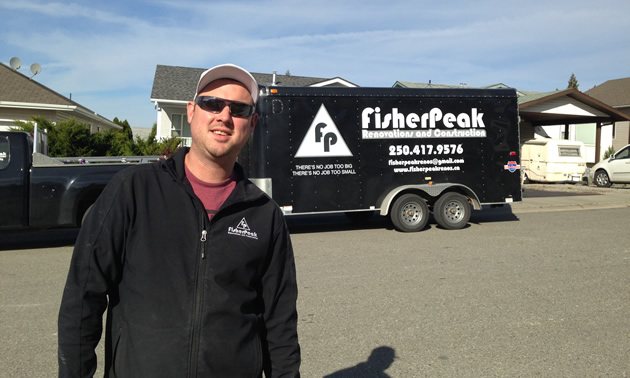Renovation dedication
In a cool economic climate, Fisher Peak Renovations & Construction is a hot pick for your home upgrades
It takes a unique skill set to successfully change the structure of an existing entity, whether it’s a piece of clothing, a manuscript, a business or a building. If the project is a building renovation, then Dustin Willoughby of Fisher Peak Renovations & Construction (FPRC) in Cranbrook, B.C., is your go-to guy.
Willoughby grew up in Golden, B.C., and at the age of 18 he began working as a plumber. He switched to carpentry in 2004 “and just loved it,” he said.
When Willoughby and his family moved to Cranbrook in 2006, he got a job working for Robert Paulson General Contractor Ltd.
“I worked there for six years,” Willoughby said, “and that’s when I really started liking renovations. Within six months of being there, they let me run small crews. I got to work at every aspect of construction, so I have a broad range of skills.”
Stepping out on his own
Willoughby started FPRC in 2012, and the company grew quickly. Six months in, Willoughby employed one carpenter; now he has six. His wife, Erinn, helps with the administrative side of the business.
“Everyone likes to build from new because it’s straightforward,” Willoughby said. “If you’ve only ever built new houses, you likely don’t know how to tie an addition onto an older house. You have to match gables and window height, you have to match grade, you have to tie in the new foundation with the old one. It takes a lot of thinking and a lot of patience and a lot of experience and expertise. I know how to do renovations and I like doing them.”
Through the winter, FPRC mainly works at kitchen and basement renovations of varying degrees of complexity. Willoughby said he’s done kitchen renovations ranging in cost from $5,000 to $120,000. In the summer, FPRC is busy building additions on houses.
“Working for Robert Paulson prepared me well for being out on my own,” said Willoughby. “I got to know a lot of the sub-trades around town and I know the quality of their work. I have some really loyal sub-trades that I use all the time.”
Setting a standard for quality
Willoughby said there are a couple of aspects of his company that are of utmost importance to him: camaraderie and trust on the work site, and an extensive range of skills to accommodate a variety of projects.
“There’s no bickering on (our) work sites,” he said. “We are great friends, we can tackle a lot of different jobs and we all respect the work that all of us do. It took me a while to find the right crew. To work with us, you have to care about the (quality of the) work.”
Willoughby could probably make more money by taking on more than two projects at a time, but, he said, “I’d rather look at my work and be proud of it than bang out four or five jobs at a time and hope they’re good enough. It doesn’t take long for a company to gain a reputation, good or bad. This way, at the end of the day everyone’s happy, and we do a hell of a good job.”










Comments